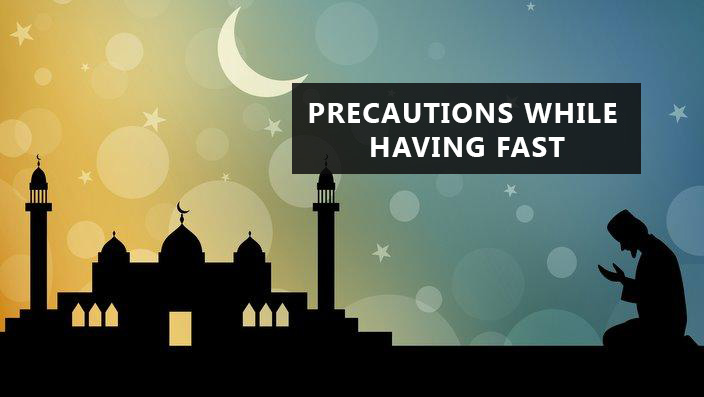As this month is spent in fasting, there are certain precautions in ramadan fasting as there are certain conditions for performing Salaat, Umrah, or Hajj. Fasting also requires some precautions and conditions or else you might end up breaking your fast.
As you know that in the month of Ramadan, the Muslims fast for 29 or 30 days. After the month ends, Allah grants the Muslims with Eid-ul-Fitr. On this day, people meet and spend time together. Children are given eidi or gifts. Friends also exchange gifts with each other on the Eid ul Fitr.
Oh you who believe! Fasting is prescribed to you as it was prescribed to those before you, that you many learn piety and righteousness” (Quran 2:183)
“The month of Ramadan (is the month) in which the Qur’an has been sent down as guidance for mankind containing clear signs which lead (to the straight road) and distinguishing (the truth from falsehood)..” (Quran 2:185)
Significance of Ramadan and Fasting:
The month of Ramadan is the 9th month in the Islamic calendar. The Islamic calendar consists of a total of 12 months. This month is considered as the master (SAYYID) of all the Islamic months. The Ramadan has its own significance or importance.
Fasting in the month of Ramadan is obligatory (FARDH). And it is, however, a sin to skip your obligatory prayers. Below is the significance of Ramadan and fasting;
- You can understand easily the Significance of Fasting as this is the fourth pillar of Islam.
- Laila-tul-Qadr is also observed in this month. This night is the best among all nights.
- This month, Allah grants His utmost and maximum blessings to the Muslims.
- In this month, the gates of Hell are closed and Satan is also caged. The gates of Jannah are opened.
- Fasting in Ramadan is equal to fasting for 10 months.
- Qur’an was revealed in this month. The first revelation also revealed in the month of Ramadan on the Holy Prophet (peace be upon him).
There are a lot of points for explaining the Importance of Ramadan. Remember, recite Ramadan Dua before having fast.
Precautions in Ramadan Fasting:
There are certain precautions and conditions while having fast in Ramadan;
-
- If you do anything that is contrary to fasting breaks your fast and that is not a good thing for a Muslim.
- You must not eat or drink anything intentionally. It is noted that drinking, eating, or performing intercourse while having fast, is never allowed in the religion. And one must always remember that he is fasting and avoid such situations.
- While you are fasting, avoid false talk and vulgar language.
- Avoid bad or false deeds.
- Do not involve yourself in any dispute or quarrel. Do not use bad words at all.
- While you are fasting, do not show off that you are fasting. Don’t act like you are hungry to show people your endurance. One must remain calm and humble, and must not show off.
- One must not involve in sexual intercourse.
- Do not smoke while you are fasting.
- Sehri and Iftari are necessary for fasting.
- Last but not the least, it is important to fast for the sake of Allah. Your intention must not be anything else than pleasing Allah through fasting.
Precautions for Fasting Medically:
Following are certain medically precautions (scientific) to keep in mind while fasting;
- If you are facing medical issues or diseases, you better not fast.
- When you break the fast at Maghrib, don’t overeat. Eat in small quantity.
- Don’t eat heavy foods.
- When you fast, you lack energy. It is important to select the appropriate foods to eat while breaking the fast.
Concluding Remarks:
One must always keep these precautions and conditions in mind while fasting because precautions while having fast is an important aspect of fasting and Ramadan.
If you are not aware of these facts and you do not follow these conditions, your fast will not be accepted even if you wait for the Maghrib prayer to eat something to break your fast. Moreover, knowing the conditions and precautions is important in Ramadan!



thanks for sharing. jazakallah.